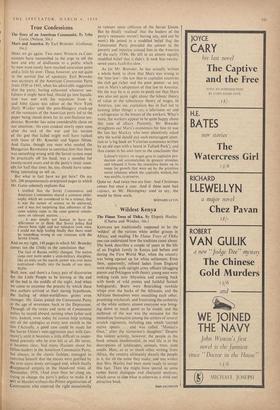Wildest Kenya
KENYANS are traditionally supposed to be the 'wildest' of the various white settler groups in Africa; and reading The flame Trees of Thika one can understand how the tradition came about. The book describes a couple of years in the life of an English family in Kenya just before and during the First World War, when the country was being opened up for white settlement. Even then, apparently, refined ladies from England were eloping with upright army officers (dragging pianos and Pekingese with them); young men werc making raids into Abyssinia and coming back with herds of wild ponies and faithful Somali bodyguards; Boers were flourishing rawhide whips over the backs of the Africans; and the Africans themselves were assaulting each other, practising witchcraft, and frustrating the authority of the white settlers; almost everyone was bring- ing down as much game as he could; and the outbreak of the war was the occasion for the immediate formation among the settlers of several scratch regiments, including one which 'carried native spears . . . and was called "Monica's Own," after the Governor's daughter.' Despite this violent activity, however, the people in the book remain insubstantial; its real life is in the descriptions of landscapes, animals, trees, even smells. Here, as in so much other writing from Africa, the country ultimately dwarfs the people in it, for all the noise they make; and one wishes that Mrs. Huxley had been more ready to accept this fact. Then she might, have spared us some rather banal dialogues and character analyses, which serve to dim what is otherwise a vivid and attractive hook.
DAN JACOBSON


































 Previous page
Previous page